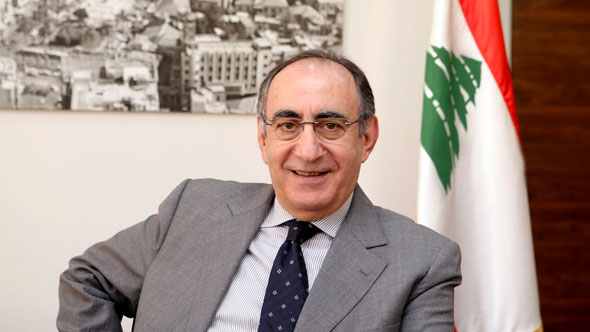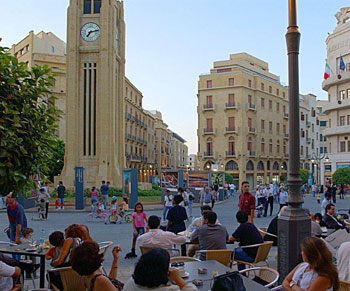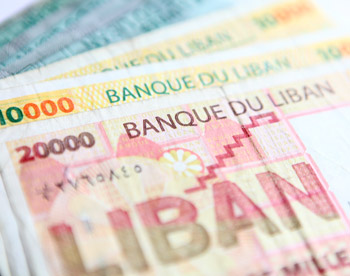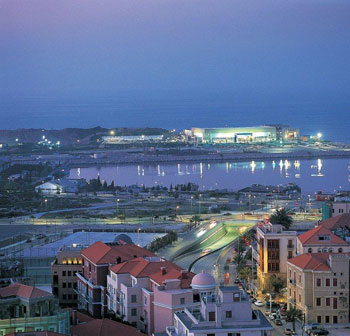Lebanese Economy in 2012: Balance of Payments, Prices, Trade and Exports
The current Lebanese government is trying to disassociate Lebanon from the regional conflicts and bring stability to the coutry in order to foster growth. Either way, Lebanese economy is different from the other economies, therefore it has to be analyzed in a different way. H.E. Nicolas Nahas thinks Lebanon has an interesting potential in long-term export.
Interview with H.E. Nicolas Nahas, Minister of Economy and Trade of Lebanon

The interview with H.E. Nicolas Nahas, Minister of Economy and Trade of Lebanon, took place on May 14, 2012 (prior to the clashes in Tripoli).
The World Bank issued the report on the MENA region in which it was indicated that Lebanon would record a real growth of 3.8% in 2012 up from 3% in 2011. What is the outlook for GDP growth in your opinion and what in your opinion are the major factors contributing to this growth, which sectors do you feel will be the future drivers?
First, I have to correct some information; I just received the visit from the World Bank on Friday and I gave them the report that was issued on May 7, 2012 by the Prime Minister´s office, on the same basis as it has been done since 1997 and the real growth was for 2011 was 5.2%, so we are not on 3.5%, we are on 5.2%, I gave them the report which is now in their hands and we are ready to answer any questions they may have, but I think that this report is feasible, it is correct, in any case it is based on the same elements as it has been since 1997.
So I think 2012 looks to be on the same path, or even better, if we take the first three months they have given a better signal than the first three months of 2011. April was not as brilliant but still our balance of payment is negative, less negative than 2011, I´m mentioning this as it´s one of the key points: our balance of payment, the balance of trade and the economic activity by semesters.  So the indications are there that it will better than 2011 if everything goes as usual, the main drivers are as usual. I think what is new in the study shown for 2011 is that our internal production is getting stronger, it´s getting bigger because the investment bank in the real sector for 7 or 8 years, in investment or assets has started giving good results.
So the indications are there that it will better than 2011 if everything goes as usual, the main drivers are as usual. I think what is new in the study shown for 2011 is that our internal production is getting stronger, it´s getting bigger because the investment bank in the real sector for 7 or 8 years, in investment or assets has started giving good results.
I think there has been a full restructuring of the private sector since the mid nineties, new management type, new way of capitalizing, a new approach to quality, new production equipment; I think all of this is now consolidating in new production capabilities. Because the study shows that in 2011 there has been a huge decrease in imports but there were better figures in terms of internal production and the cause was generated from there, so that´s a given a good sign, the second good sign is definitely tourism, after a little bit of a setback in 2011 due to what was happening around us, you know the road access from the Gulf to Lebanon has been stopped due to the events in Syria and that has a major impact on tourism, fortunately things are getting back to normal, not to normal but we are recuperating air transport and the increase in tourism coming through Beirut airport is getting bigger and bigger, and I think we´ll have a good year in 2012.
So perhaps we´re as much in the game as we were in 2010 plus or minus some minor percentages. Real estate sector in Lebanon is steady, which is good as it is already on the high end. Now our consumption per capita is 1,200 kilos of cement which is very high, we are 4 million inhabitants; we are consuming almost 6 million tons of cement which is very high. And it has been like that for a long time, so that is also a driver. I think another driver is the service sector, especially in terms of the financial sector, the IT sector and perhaps the Lebanese fashion sector which is mostly on the industry, it´s not yet counted as an industry sector.
I think these are the main drivers of the economy and I think we are working on that, we are trying to enhance all of that, the government is trying to give a big move ahead in restructuring some of the basic laws, in revamping some of the basic laws and modernizing some of the basics laws, making business in Lebanon easier, more streamlined, and less costly. I think that is very important we are modernizing 7 to 8 laws which have a big impact on the way you do business in Lebanon but there is still a lot to be done in this respect but the government is working on reducing operational costs for businesses, giving tools to the business community which will enable them to have access to easy finance, to have access to good service and to have access to good technology and educated manpower.
Lebanon has a totally different pattern on how your address your economy, how you analyse your economy, how you evaluate your strengths and your weaknesses, your sword is a very different sword than anybody else, because of our Diaspora, because of our rhythm, because of many things…
This is the vision for the long-term. We are trying now to put some of these elements into motion, but the vision is complete, and the way forward is complete, but what could be implemented in the coming year we are now trying to choose our priority and to see where to start from and to allocate the time and resources for the real priority which is here and now.
Because you can´t do everything, we have a huge list of things to do, so in one year you can´t do all that, so we are defining our priorities and trying to see that yes in one year we can do this and this and this and give all the potential on this.
Of course we have been meeting with the private sector and not everyone is optimistic about the government; most people are negative about the government. What measures should be taken by the government just to stimulate a growth in the economy and do you see it, now that you´re in government, leaning towards the involvement of the private sector, more liberal policies than more of a socialist, nationalistic policy? What is the government´s economy policy?
First of all, if you mean growth you need basic elements of stability, without stability nothing can be done and this government has taken on its shoulders to bring stability to the country, especially when you can see what´s surrounding us, we are trying to disassociate ourselves from many of the very hot conflicts which are surrounding us, and this is very important and it´s not easy. So we are trying to keep the country from falling apart, to still have a space where people could meet, could discuss, could express their differences, this is very important, this is how democracy functions and we are trying to keep democracy function in the best way possible.
I think these two elements are the key to put any policy into place, for putting any vision into place, without that it would be like saying anything and nothing. Making that the government has defined its priorities in its Ministry Declaration and we´ve said that the highest priority is reducing operational costs for the private sector,  secondly to review most of the structure which is governing the private sector, to bring the private sector into the public sector to provide services and especially in developing the infrastructure, fourthly to count on and to revisit the whole approach towards education, today I think the key to the success of the Lebanese is because of their education because of their access, the accessibility to know-how, to knowledge, to the whole way of doing things in life and we are competing where we are, whenever we are with the most advanced systems.
secondly to review most of the structure which is governing the private sector, to bring the private sector into the public sector to provide services and especially in developing the infrastructure, fourthly to count on and to revisit the whole approach towards education, today I think the key to the success of the Lebanese is because of their education because of their access, the accessibility to know-how, to knowledge, to the whole way of doing things in life and we are competing where we are, whenever we are with the most advanced systems.
It doesn´t mean that we have to say that it´s enough, I think we still have a weak point in our system is how to prepare people who don´t reach college, don´t reach university, here we have a big effort to be made, because people who get to the market before getting to university and to college don´t have the necessary know-how to have added value in whatever profession they undertake, I think this is a key issue in the way to move forward for the country.
All others are easy to handle, this is the most difficult one, to bring the private sector to providing services instead of the public sector, that´s any of the things but still there is some arguing within the government on when and how the private sector should go in. We are now developing the PPP law, we are revisiting some of the regulatory body laws and I think within months or weeks we should have the final option on the regulatory body and the PPP and then we will open the doors wide enough for the private sector to begin a journey in providing services for the country instead of the public sector. This is important. So, as I said, a review of a very old fashion law which is limiting the private sector´s capacity to have access to financing, to knowledge, and to many things. And fourth, let´s say to see how we can bring quality and innovation to systems, to give a lot of incentives to the private sector to get quality and innovation to be part of the system because otherwise we can´t move forward and also growth should not only be in Beirut and the surrounding areas, they should be for all of Lebanon, for that the government is trying to develop some laws, one of them is already implied which is for the Tripoli Free Economical Zone, our special economical zone which we are trying to put in other places and to have a kind of agreement with some of the Gulf countries in order to develop some of these special zones in order that growth is not only located in one place, and at the end also trade is an essential part of how to promote our commerce and our products, and we are viewing some of the trade agreements we have with different countries, we are pushing towards accessing the OECD and I think applying some of the regional agreements we have will also have big impact on developing our commerce and trade with other countries.
Some of the major challenges many people argue is continuity, if you want to develop certain policies and you have one year to do so it is of course impossible. Now we have an election coming up, what in your opinion is possible for you to change?
We have issued a document which has been circulated inside the government to be discussed and reviewed, this is the Social and Economical Action Plan, I can give you a copy of this plan, there is the whole approach of why we are doing that, the idea behind it, the philosophical approach behind it, and what are the measures that should be taken, the seventy-five measures that should be taken, when, how, the budget for that, the forecasted repercussions of that. I think that´s what we´re doing very well.
Do you see the will from the government, that “yes, we´re going to do that”…?
Yes, this is under discussion within the government, yes, the government has the goodwill to do that, what this government has done nobody has given us credit for, we have taken so many difficult decisions, we have really been in difficult areas, and we have been able to take very important decisions. Even though some of these decisions were taken in kind of hot discussions, nevertheless we have taken decisions and the number of decisions taken by this government by far exceeds most, if not all of the governments before us in one year.
Now let´s talk about the balance of payment deficit of 373 million in the first quarter of 2012, what is the outlook for the balance and for imports and exports? Do you feel Lebanon is creating an export economy, export base? Do you see it as a challenge going forward?
Let me be frank with you, yes if we take export services, if we took export products and services, Lebanon has a good chance to win. Resource intensive product it would be difficult, don’t have a lot of natural resources, and we have a high cost of production, we have the highest cost of production: the high cost of energy, we have a high cost of transport, we have some handicaps, today I can´t see a product which doesn´t have a lot of added value that we can compete so fast and have our system, our product export to go very fast.
On the service side, well the added value is very high and the impact of such costs as is applied to the products is not the same, and is a little different, very minimal, I think we are competing, our engineering services, our financial services, our health services, all that kind of services we are giving, are exporting very beautifully outside. And that´s very important, and this is part of the information that we are receiving.
So I think Lebanon as export on the long-term has a very interesting potential. Now why is our balance of payment negative for the second year? I hope that this year it will end by a positive one, because if we compare it to last year it´s definitely much better but still negative by 300 million, but the trend is up and not down, so I´m not so afraid about this trend, so that´s one of the most important assets we have, the capability to attract capital.
I think the reason for that is not the economical side, it´s mostly what´s happening outside, it´s receiving inflow from the Gulf, receiving inflow from all places, a little a bit not scared today about what is happening today in Syria and Jordan, but this area is becoming a little bit questionable for the investor. So we are receiving a lot, we are receiving as much as in 2010 which was the highest year, but today the reserve of the Central Bank is at the highest level ever seen so that´s giving a kind of influence and satisfaction to the investor.
I´m confident that by the end of the year the balance of payment will be back positive, hopefully and the most important element in that is also the transparency and strict adoption by our banks of the Basel III agreement, because that will give more confidence back to the investor, and our banks are surviving very well the whole drama which we are living around us.
You mentioned that the economy is growing; Lebanon has been able to reduce its debt, but it is also important that the World Bank argues that countries with a high level of indebtedness such as Lebanon which I think the debt is reaching 130% of the GDP, particularly Lebanon remain specifically vulnerable because they have relatively high external financing limits so you need to attract a lot of financing and a large foreign account deficit, according to the World Bank the fiscal deficit worldwide in 2012 compared to 2011 because of a sizable rise in public wages, Lebanon has risen public wages, so is public spending a major concern to you and what should be done?
Yes it is, definitely. If I said no, I´d be unfair to myself. I think it is a concern but I´m sure the government will adopt a balanced way where there is not so much deficit, where there will be a reasonable budget within a month´s time from now and I think the Prime Minister will distribute to all Ministers the guidelines, how the budget should be established and there is a kind of golden rules which is being provided, and I hope the golden rule will be applied, the kind of deficit we ought to have to GDP, the kind of debt we can have to GDP, the kind of primary surplus we would like to have, the kind of growth we are expecting, the kind of inflation we are expecting, all of this is embedded into the new budget which is under preparation.
If the government can accept these rules and accept this approach, I think even with the increase in wages which we decided on 2-3 months ago there is some new permutation of taxes which could apply, not perhaps touching the same kind of sector where they were applied before, because there are some sectors where there is no taxes today and that could be addressed without harming the whole economy.
I don´t want to go into details, there has been the list established by the Minister of Finance stating where, bringing more income into the budget, to the government, and avoiding to go into really red area, could be a good solution, and if we succeed in passing it all of our financial ratios will be in better shape and I hope that in 2012 we have 6% growth, I hope, if nothing major happens around us, or within the country. If everything goes well I´m hoping for 6%, because some of the measures and rules we are going to apply and some of the decisions we are going to take should have an impact on that. So let´s see, having consistent growth, maintaining continuity I think this is the path for tomorrow, not forgetting growth.
Our drivers are mostly from outside, from the remittances that we are receiving, from different issues, Lebanon has a totally different pattern on how your address your economy, how you analyze your economy, how you evaluate your strengths and your weaknesses, your sword is a very different sword than anybody else, because of our Diaspora, because of our rhythm, because of many things, because of the Gulf states for this country to breathe, to have a good place to live, etc. They come here for I don´t know, maybe one month, ten days, twenty days per year, but this gives a kind of support to many of the weaknesses we have, so this is a different pattern. This is an atypical country. Lebanon is special.